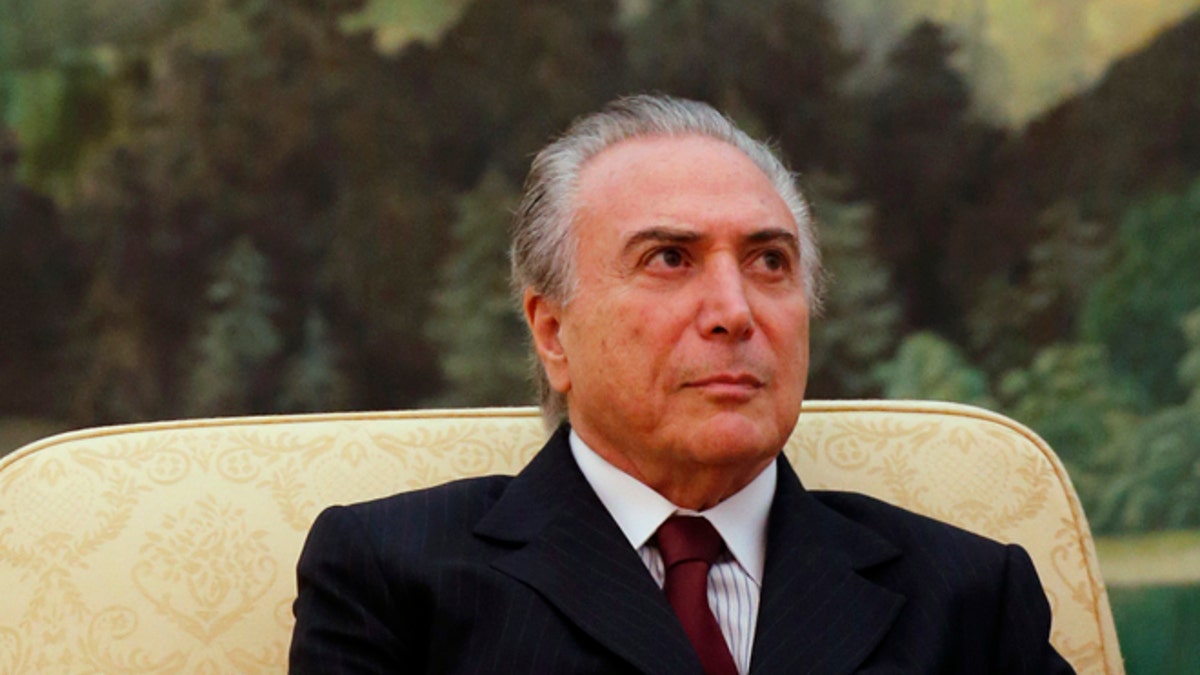
BEIJING, CHINA - NOVEMBER 07: Brazil's Vice President Michel Temer is seen during a meeting with China's President Xi Jinping (not pictured) at the Great Hall of the People on November 7, 2013 in Beijing, China. The Brazilian Vice President Michel Temer is on a six day visit to China. (Photo by Kim Kyung-Hoon - Pool/Getty Images) (2013 Getty Images)
The vote by Brazil’s Senate on Thursday to impeach President Dilma Rousseff changed the lives of many in the South American nation, but probably no one was more affected by her suspension than Vice President Michel Temer.
While Rousseff now will sit on the sideline of Brazilian politics while the judicial procedure against her moves forward, the 75-year old Temer takes the helm of a nation in a deep recession that is also battling an outbreak of the Zika virus, skyrocketing crime rates and the impending logistical and security nightmare of this summer’s Olympic Games in Rio de Janeiro.
Despite both being in the ruling Worker's Party, Temer and Rousseff could not be more different in terms of personality.
Rousseff – a political outsider until she became president in 2011 – is known for her gruff demeanor, stubbornness and sometimes bungled speech. Temer – a former congressman and former speaker of the lower house – is an eloquent speaker, a conciliator and something of a charmer.
The career politician is also thought of as a renaissance man. The son of Lebanese immigrants, Temer is a lawyer and a licensed constitutional law professor at Pontifical Catholic University of São Paulo, as well as the author of a number of books on the subject.
Temer has also published a saucy book of fiction titled, “Anonymous Intimacy.”
The book was purportedly inspired in part by his wife, Marcela Temer, a 32-year old former beauty queen whose sister has posed in the Brazilian version of Playboy.
While Marcela , who has been called the Carla Bruni of Brazil, may not be as much of an exhibitionist as her sister is, she did get her husband’s name tattooed on her neck.
Despite his long history in Brazil’s political circles, Temer is also known as something of anomaly. He mixes Rousseff’s economic interventionist predilection with a social liberalism that includes opposition to the death penalty and favoring legal abortions.
Unlike Rousseff, however, Temer is also popular among financiers for his detailed plan to help Brazil's crumbling economy rebound, which the Financial Times called "the ultimate investors' wish list." Temer has promised to cut spending and privatize many sectors currently controlled by the state.
Alessandra Ribeiro, an economist at Tendencias, a São Paulo-based consultancy, said Temer and his future government likely will adopt a "different mind-set toward the economy — a more mainstream, market-friendly approach." She expects the Brazilian economy to return to growth in 2017.
Despite his popularity with investor types. he is not well liked by the Brazilian public as a whole.
Temer himself is under investigation for allegedly receiving more than $1.5 million in illegal campaign contributions from a company that has construction contracts with Petrobras. The vice president denies any wrongdoing, but polling shows the majority of the country wants him impeached as well.
During the protracted impeachment fight, Rousseff claimed that he intends to dismantle popular social programs that have lifted an millions of people out of extreme poverty in the last decade.
Temer has denied the suggestion, but it hasn't entirely quelled anger among the Brazilian public.
"Dilma is a bad president, and waiting until 2018 was a horrible option," said Rio cab driver Alessandro Novais, minutes after the vote. "I don't think Temer will be much better, but at least we can try something different to overcome the crisis."
The Associated Press contributed to this report.
